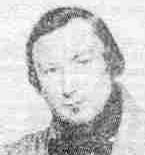De Penguern and other Breton song collectors


Songs collected by De Penguern with their counterparts in the Barzhaz Breizh | |
|---|---|
| Songs collected by De Penguern | Counterparts in the Barzhaz Breizh |
|
An den kozh dall (The old blind man) An Ivern (Hell) Ar bleizi mor (The Sea Wolves) Ar bugel koar (The wax child) Ar Butuner (The Smoker) Ar kloarek marv (The Death of the Clerk) Ar paper timbr (The round dance of the stamped paper) Ar ribot (The churn) Ar sorcerez (1 - 2) (The Witch (1 -2)) Ar veleien harluet (The priests in exile) Argad Saozon (The raid of the English) Fontanella (Ifig Troadec) Gwreg Ahes (Hag Ahès) Itron ar Faouet (The Lady of Faouet) Lezobre (Les Aubrays) Marie (Marie) Perrinaik Lannuon (Perrine of Lannion) Rosmelchon (Rosmelchon) Tostaït amañ Plabennegiz (Come near, people of Plabennec) Va broiz me zo pell diouzhoc'h(Amis, si je suis loin de vous) |
Diougan Gwenc'hlan (Gwenc'hlan's prediction) Ar plac'h dimet gant Satan (Satan's bride) Alan al Louarn (Alan the Fox) Ar rannoù (The Series) Ar melezourioù arc'hant (The Silver Mirrors) Paotred Plouyeo (The young men of Plouyé) Jannedic (Mme de La Villemarqué) Loiza hag Abalard (Héloise and Abélard) Ar beleg forbannet (The exiled priest) Emgann Sant Kast (The combat of Saint Cast) Fontanellan (La Fontanelle) Bosenn Eliant (The Plague) Gwreg ar C'hroazour (The Crusader's wife) Lez Breizh (Morvan Lez-Breiz) Kan an Arvel (Song of the cupboard) Emzivadez Lannuon (The Orphan of Lannion) Filhorez Ao Gwesklen (Duguesclin's Godchild) Ar beleg forbannet (The exiled priest) Ar Chouanted (The Chouans) |
Songs with their Counterparts in the Barzhaz Breizh | |
|---|---|
| Songs | Counterparts in the Barzhaz Breizh |
|
Gwerz Janed ar Mareg (Lament on Jenny Le Marecl) Leskildri (Madame de Lesquildry) Ar roue Gralon ha Keris (Gralon and Is Town, a poem by Olivier Souvestre) Marc'heg ar Roue (The King's Knight, a poem by Auguste Briseux) Sant Henori ("Saint Honora" collected by Donatien Laurent) |
Jenovefa Rustefan (Genevieve of Rustefan) Pardon Folgoat (Le Pardon du Folgoët) Livadenn Keris (The Submersion of Ys) Lez Breizh (The King's Knight) Tour an Arvor (The Armor Tower) |